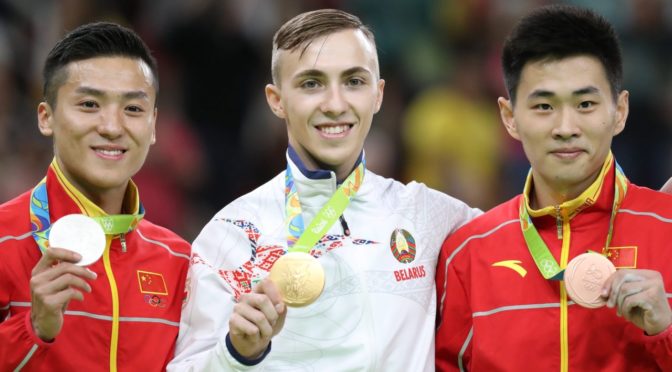China Medal Count
13 gold, 11 silver, 17 bronze
Day 8: Medals
Silver: Dong Dong (men’s trampoline)
Bronze: Gao Lei (men’s trampoline); Duan Jingli (women’s rowing double sculls); Li Yuehong (men’s 25, rapid fire pistol)
Day 9: Ones to Watch
He Zi and Shi Tingmao qualified first and second in the women’s 3m springboard final, making China a strong favorite for the gold medal in this event. In gymnastics, Wang Yan lines up in the women’s vault final, while teammate Shang Chunsong goes in the uneven bars. In the athletics, Su Bingtian and Xie Zhenye are through to the semi-finals of the men’s 100m, but will need the race of their lives to make Sunday’s final, while Zhang Guowei leads China’s high jump charge in a bid to make the final. Elsewhere, there is plenty of other Chinese interest, but look out for windsurfer Chen Peina who has won the last three races and is up to third overall with just the medal race to come.
Day 8: Review
Not for the first time at these Olympics, Chinese athletes filled two of the podium’s three steps – but, again, the gold medal went elsewhere.
Gao Lei and Dong Dong qualified in first and third, respectively, in the men’s trampoline event, with Uladzislau Hancharou sandwiched in between them, but the Belarusian soared above both in the final, posting the highest execution score and second-highest time of flight. He also became the first non-Chinese gymnast to win a men’s Olympic or world trampoline title for nine years.
Elsewhere, it was also a day of what might have been.
Zhang Fusheng qualified in second for the men’s 25m rapid fire pistol, but slipped out of the medals in the final. Teammate Li Yuehong managed a bronze in a closely-fought contest, but missed out on silver after losing a shoot-off to Frenchman Jean Quiquampoix.
Duan Jingli finished third in the women’s single sculls, but Wang Jianan finished fifth in the long jump, and in the pool the women’s 4x100m medley relay team – which included new internet darling Fu Yuanhui – finished just outside the medals. Fu continued to surprise after the race, this time saying that her period had affected her performance.
Meanwhile, the men’s medley team was disqualified for an early takeover, the second time this Games that pin-up Ning Zetao’s relay teammates had let him down before he’d even had a chance to get in the water.
But with no diving or table tennis medals on offer, Saturday was always likely to be a slow day for China and the country still sits comfortably in second place overall in the medal standings, a position it is likely to keep.
China’s gold medal deficit to the US already sits at 24-13, and that is only likely to increase as the track and field events get into full swing during the second week of the Games.
But just as the re-balancing of China’s economy has been a painful, if necessary, process, with different parties pulling in different directions, so, too, is the process to move away from an obsession with gold medals.
In principle, it’s a good idea to focus on creating a healthier nation, but at the sharp end of international competition, officials tend to revert to what they know best: setting gold medal targets and pressuring those around them to make sure the targets are met.
For all the talk from those at the top about a change in strategy, the pressure on many of China’s athletes is all too clear and, unusually, some of them have even said as much.
Concerns have previously been raised within China that nations which preach a more holistic, happy attitude to sport tend not to do as well at the Olympics, but with two of those nations – Great Britain and Japan – currently lying third and fifth overall in Rio, those arguments don’t seem to hold much water.
China’s sporting transition might continue to be a little painful, but with more and more people across the country taking up sport voluntarily, the chances are that China will continue to impress at the Olympics for many years to come.


